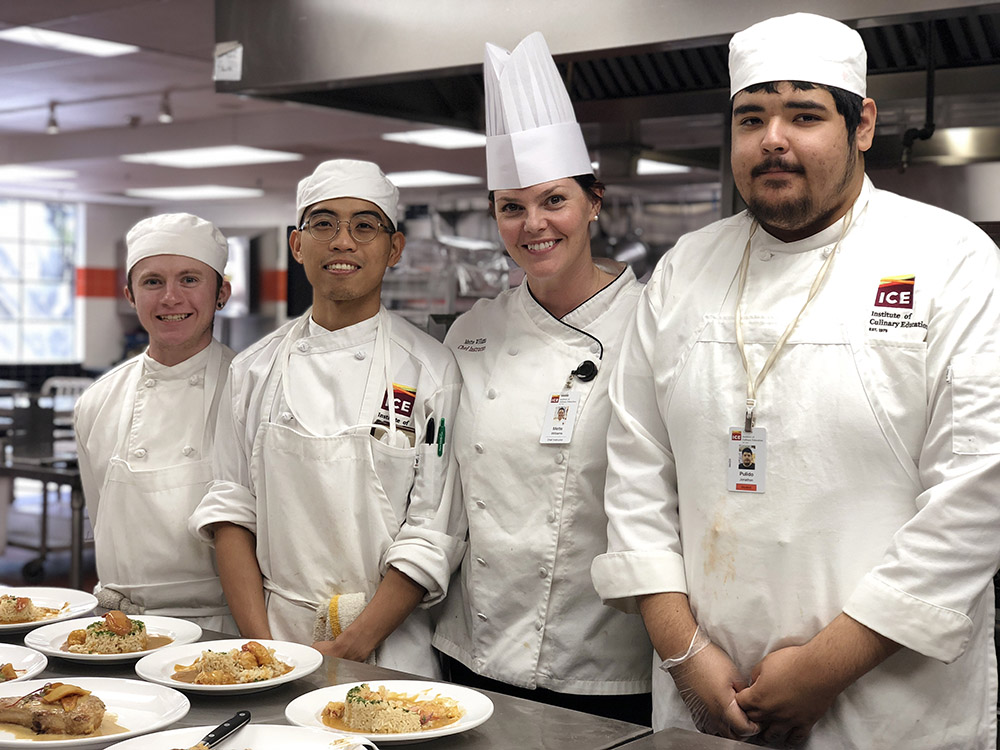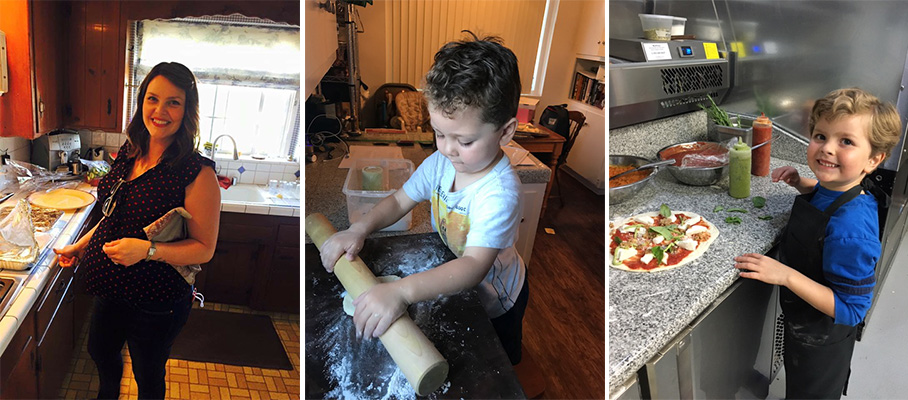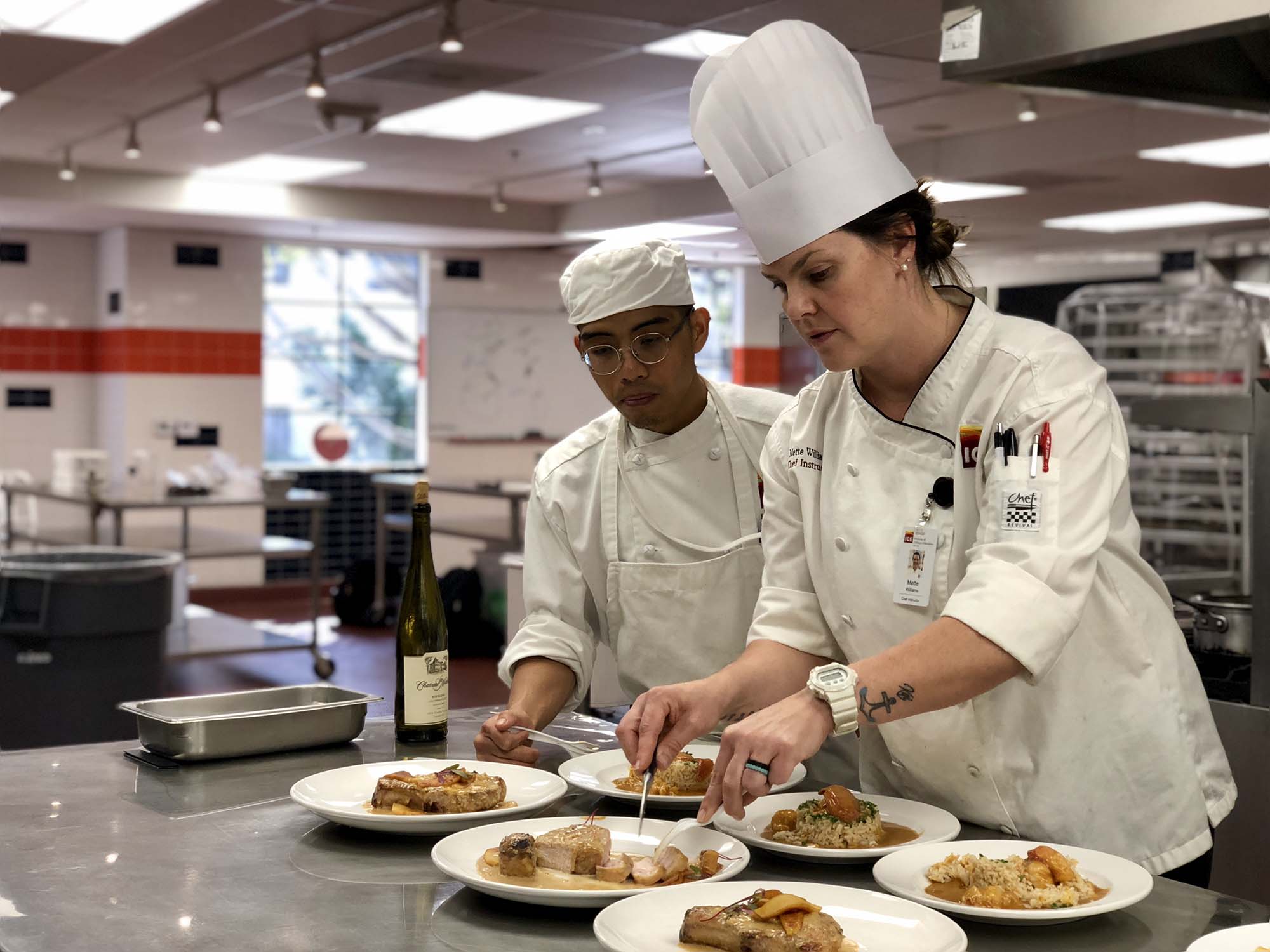Many of us can recall time spent in our mother or grandmother’s kitchens during childhood. However, few of us might have actually cried when we weren’t included in the cooking process — Chef-Instructor Mette Williams shed tears.
Chef Mette identifies her early interest in all things culinary as a direct result of time growing up surrounded by food, farmland and family. For her, food was not only a passion that flourished during her youth, but a true obsession. Here, we discuss how Chef Mette’s mother encouraged her to follow her instincts and how motherhood currently shapes the way Chef Mette approaches the kitchen-classroom.

When do you remember first being interested in cooking?
Beginning at age 3, I would help my mom bake cookies when my little sister was napping. I would ask if I could crack the eggs — I loved seeing things and breaking stuff. One day when I fell asleep with my sister, I was almost in tears that my mom didn’t wake me up to help. She still feels guilty about it. I knew from that point on, cooking was something fun and creative to do. Plus, I really liked to eat.
How did you spend your early years?
I grew up around fresh berries, apple orchards and a garden full of vegetables in Kentucky. I didn’t come home and watch TV or walk over to neighbors’ houses. I’d ride the bus, walk down the gravel hill to my house and down the valley to my grandparents’ home. They grew tobacco on their 130-acre farm which they would harvest, hang on rafters and use a homemade press to eventually sell it. They had cattle, too, and we would walk the pastures to feed the animals. During birthing season we’d name all the cows and be one with them; it was great.
That was clearly a good environment to stoke your love of food.
I’d say my love of food was from my mom when I was young, but around age 8 or 9 is when I understood the processing of food, when we canned and pickled on the farm. We had a cellar in my grandmother’s basement where we stored everything. Then I started making dinner for my family, things like tuna noodle casserole.
When did you consider food as a career?
I continued to cook through high school, and I was interested in biology and anatomy. I started thinking about going to nursing school, but there was a waitlist. As a result, I had to figure out what I would do. My mom suggested culinary school because all I did was watch Food Network and write my own recipes. At the time, we were living in Southern California, so we took a tour of Le Cordon Bleu in Pasadena. I liked it, but she surprised me with a trip to San Francisco to visit California College of the Arts (CCA). I fell in love with the city and I signed up the day I took the tour. Two months later, I started.
What were your impressions of culinary school?
We had three student-run restaurants on campus. It felt challenging and quick paced, but as long as you had a foundation and were good at multi-tasking, it was a fun place to be. I had never worked in a restaurant before, but if it’s inside of you and you have the drive, working in a kitchen will become second nature.
Your first post after culinary school was at Postrio, a Wolfgang Puck restaurant housed inside the Prescott Hotel. How did you land such a good gig?
I went in before externship time and said, “I have never worked in a kitchen, but I want a job and want to know if there is a place here for me.” They asked me some personal questions, but they didn’t ask me about cooking at all. I got the job for $11 an hour. That right there made me realize: it’s not how much you know about food, it’s how much you enjoy it and how much you are willing to learn that matters.
What were the key things you learned working at Postrio?
It was a really great first job as they were very welcoming and very educational. They would ask us to go into the walk-in and come up with a menu special. We ran it by the chef and they would tweak it and then run it. We had our own bread, butcher and pastries; it was a good environment to see how everything was made from scratch. I made mashed potatoes, polenta, potato galettes, rendered off duck breasts, blanched green vegetables and roasted vegetables, and I took care of stocks and helped with sauces. I did that for about two months before I moved upstairs where we made homemade sausages and pizzas.
When you came back to LA, you remained in the Wolfgang Puck family by joining Spago. Why did you choose to stay with the restaurant group?
They don’t settle. Their standards are high and they teach you to respect the food and the people you’re working with. They make it a team effort to look at other stations and help people out and to use your senses in the kitchen — if the bubbling stops in a sauté pan, you probably need to take it off the flame. We also did a lot of big parties as they had catering from that location. It’s a crazy well-oiled machine and that’s why it’s still there.
At Spago you were the only woman on your shift. What’s it like being the only female in a kitchen?
At that time, it didn’t even cross my mind because I was so into my job. I didn’t get shunned for being a woman. I moved up the ranks, I ran the line, and I earned all my positions and helped other people when they needed it and worked hard. That goes back to my interview for my very first job — based on personalities, either you’re going to make it or not. If you don’t get along with people, they aren’t going to want you around and they aren’t going to help you if you need help.
When you were considering starting a family, what were your concerns about managing a career in the back of house?
I wasn’t considering a family! My first pregnancy was not planned. That being said, I was totally freaked out about having a kid while starting my first executive chef position [at Lexington Social House in Hollywood]. One thing that really kept me at ease during that time was the staff I had cultivated. My husband, my pastry chef and a former sous chef of mine were in the kitchen, so I knew I had solid support. To be honest, I really didn’t think about my pregnancy that much in the beginning because I had an opening date to worry about!
Were you treated differently by your staff when you were pregnant?
I worked up until one week before I gave birth. The first few months you’re tired, but your senses are elevated, so I could smell something burning before it burned. It was like I had Spidey senses. I really enjoyed it. Working also kept me active. While I wanted to be sure I was giving myself the best nutrition, I also wanted to give that to the customers. It wasn’t until I started to show that I let the staff know about the pregnancy (minus the owners). Then it got difficult to fit behind the line. My belly got in the way and more than a handful of sauté pans were knocked off the line! No one let me lift anything too heavy, food runners brought me fresh fruit to eat, prep cooks made me snacks and I pretty much just carried on as I would have. My main job during service in month seven and eight was to expedite, as I was in the way if I stayed on the line. I had great support from everyone I worked with.

How quickly were you back in the restaurant after giving birth?
After my son was born, I took 3.5 months off. It was easy for me to just forget about work and totally enjoy being a mom. I was able to do this because of the team I had.
Was it weird going back to the kitchen?
When I returned to the kitchen, it was hard: the long hours away from my son, the pumping station I had to carry around and the sheer fact that my number one interest wasn’t food anymore.
When it comes to having a family and being a chef, what is the key to work-life balance?
When you find out the answer, let me know! Having a meaningful balance between work and life is something that takes a long time to figure out. I am on that path, now that I have been lucky enough to become an instructor. I had a second son three-and-a-half years ago and I was able to take five months off. During that time, I knew that I was going to be needing a career change, slightly. Even though I was away from my boys most nights, I made sure that whatever time we did have together was totally devoted to them. If you can’t spend a lot of time together, you need to make sure that the quality of time together is the best that it can be. My love for food and the intense kitchen atmosphere is something that I will always have, but I was certain that I needed a job with which I could make sports games on the weekends and help with homework at night.

What impact has working as a chef-instructor at ICE had on your parenting?
My kiddos have always been little foodies; they peel, chop, roll, wash, bake… we like to have fun in the kitchen. I think that my ease with them making a mess is partly because I have 16 students who are still making messes. It is a total parenting outlook when I have to tell the students every day to clean as you go, don’t crowd your cutting board, make sure you have your sanitation buckets.
Working as an instructor has also helped me maintain more of a consistent schedule with my family. I feel that I can come home and be totally devoted to my kids, not having to worry if someone calls out for a shift, making sure orders are in and food cost is in line with budget, scheduling, handling a VIP walk-in or taking care of equipment failure!
And vice versa, how has being a parent prepared you for teaching at ICE?
Patience: I give people my attention when asked and remember that I am here to give the best possible experience to the students. I want them to feel confident in their education and understand that each place they go will be different, but if they hold on to the foundation and are always willing to learn, they will succeed.
Study Culinary Arts with Chef Mette at the Institute of Culinary Education's Los Angeles campus.




